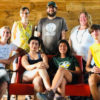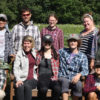My last day of school at Calvin College was rife with mixed feelings. Of course I was relieved, excited, and well past ready to have completed such a grueling four years. The prison gates were, finally, finally, opened. And yet, the closure of such a deep experience also left me bereft, apprehensive, and lost. Out of the prison gates I had no idea where to go.
This crisis of direction is not unique to me in particular and probably not to any single generation; however, I venture that my generation experiences this crisis in a different way. A whole new age group–the “20-somethings”–has fallen into the current cultural lingo and, perhaps as well, the current existential experience of people like me. Typically, this group is characterized by the college-graduated-jobless-living-at-home-with-parents 20-something-year-old who, despite rigorous education, has no idea what to do with life. How’s that for irony you hipster grads?
This common experience has serious repercussions, one of which is a deep sense of malaise. Post-graduation there is a sense that something has been lost, that one has been left in the dark. Well-trained, the graduate now sets sail out past the reach of the lighthouse and its guiding light. We come to find ourselves in dark and troubled waters, perhaps more dark and troubling than the absurdly late night study crams our institutes disciplined into us. For now we must row alone.
The problem, however, comes amidst the tumultuous waves and stormy skies of goodbyes and transition. Dropped into our rowboat, still frantically paddling from our senior sprint, we charge aimlessly, having no idea where to go in this wide sea. At graduation I found myself in the throes of paradox: I had reached my hard fought destination, the end toward which I’d been aiming for so long, and yet I knew no home. I was restless. To continue my education, to bear its fruit. Restless to continue the friendships and community I had so rooted myself in. Restless to still belong somewhere.
I had arrived but where I had arrived was transitional. The same goes for college–a drawn out transition from a coddled teenager to an “independent.” And the same goes for everything in the foreseeable future: everything from my summer here in Three Rivers to my time at L’Abri in Switzerland to wherever I finally “settle” (for even there my experience will leave me a nudge out-of-place with my family and friends scattered across the earth).
And it was a whirlwind, be assured. There I was, in transition, all of my airport hellos and goodbyes rolled into one heart-rending blur compounded by family and friends and then almost entirely dissolved just a weekend later. Graduation is not only too abrupt it is profane. It fails to revere such a sacred time. But alas.
* * *
All of the above was what spilled out in my first reflection time after a morning’s work at Huss School. Asked to reflect on the “imaginative space” Huss is deemed to be, I found myself only struggling against the whelm of graduation, its emotions but also its import. What had struck me the most as I worked was the deep sense in which college (and twenty-two years of American (yea human) life) had oriented me in a certain direction, pushing and pulling me toward . . . something, something that inhabited an implicit space in my thoughts and heart over the years and something that remained fluid and vague even as I graduated. That something is something I think I’ll have many years to work out. But what I want to consider here is simply the experience of being oriented toward.
Rob and Kirstin told us as we met for the first Huss School work day that we would end the day with a half-hour of reflection. A time to consider our work and the imaginative possibilities it might spark. This got me going, needless to say, on thinking about the nature of work. I was raised with a fairly strong work ethic so it wasn’t necessarily griping that raised these thoughts. I was, however, tired, without breakfast, and assigned to not only move piles of wood from one end of the building from which they’d just been moved, but also to empty and restock sawdust toilets! (In fact, the sawdust toilets were surprisingly simple, clean, and much less frightening than the dark abysses of other portable waste management facilities).
As things started moving, however, I regained some spirit. It was nothing special, but I made a point of cleaning thoroughly, keeping in mind how I would respond to a toilet spotted with sawdust when already apprehensive about this “alternative” option. Now, I won’t feign any profound spiritual or emotional experience . . . I was tired and wanted to go home. But I did ponder something I had heard before. A teacher and good friend in high school once offered me a Buddhist koan that goes something like this:
A master and his student are living together and each day the student fiercely practices his meditation. Set upon achieving nirvana the student meditates with almost physical exertion, as if trying to grow a beard over night (sorry, my addition). Meanwhile the student’s master quietly goes about the daily chores. Finally, in a collapse of exhausted frustration the student asks his master “Why are you doing the chores, why do you not mediate incessantly like me?” The simple reply: you can find nirvana in doing the dishes.
Perhaps one way to understand this story is to make a distinction. As Mother Teresa has been quoted, we are called to be faithful not successful. And I think this goes for all aspects of our life, regardless even of whether we consider ourselves religious or not. The Buddhist student is misguided not because he meditates but because he tries to succeed at meditating, whereas his wise master meditates faithfully. For the student, it is as if he has some dead-lined goal he believes he can achieve by following these certain steps. For the master, on the other hand, nirvana is something much more fluid, moving in and out of his daily life, constantly re-centering him.
As I performed my menial labor I had two thoughts: one, “this sucks we’re just gonna have to do it again” and, two, “but that’s ok.” Initially, I found myself confounded by this seemingly pointless work–I had a two degrees for Pete’s sake and I was sweeping floors?! However, in asking what the point was of this work, I saw how progress-oriented I had become in my college years. Sure, the plans for this school are much greater than constantly cleaning a not-yet-renovated building and, sure, we definitely need things to get going. However, especially with *cino’s Huss School project, the point is not to succeed.
Instead, I offer the clunky term of “cyclical traction” as the point of all our work. Rather than positing some success-goal toward which we linearly progress, faithful work is something of a tornado. It is work that centers on some essential spirit–“the imaginative space,” for example–and then, in its whirlwind, hopefully it touches down, tears up a bit of ground, and makes a difference. The equally clunky visual/substitute-asterik-break would look something like this:

Work of this kind should rather be called something like “workship” for it is work that faithfully worships something. Something like finding nirvana in doing the dishes, work centered on the imaginative spirit living in *cino is a matter of remaining faithful to core principles. Hence, the all-by-hand parking-lot weeding session held last week in the name of environmental care. Even at this level of the mundane it matters how you work, the way in which you see it as a worshipping practice of a worthwhile idea and not just some pointless task to keep the interns busy.
In this way, I’ve come to see my internship much more as an apprenticeship. I am here to help and I hope to serve the project as effectively as possible; however, my time here is temporary and the gift I receive during it is this new education that doesn’t merely equip me to succeed but even more forms me to be a more faithful person. Faithful to the work I do, to the life I lead, to the community in which I’m in.
The same teacher who offered me the Buddhist koan also suggested that all middle school students should be sent to labor camps. Outrageous it may be, but his suggestion hits on this idea of workship I’ve explored, for the aim there would be to harness all that wild energy, center it upon repetitive laboring, in the hopes of forming such students into better persons, not merely educated achievers. My first day at school, in other words, was a lot of (well-spent) unlearning.



